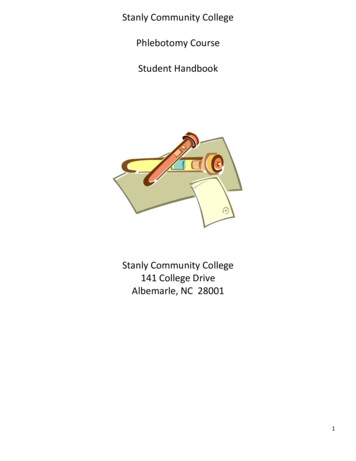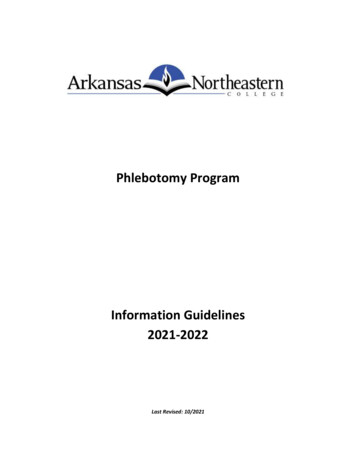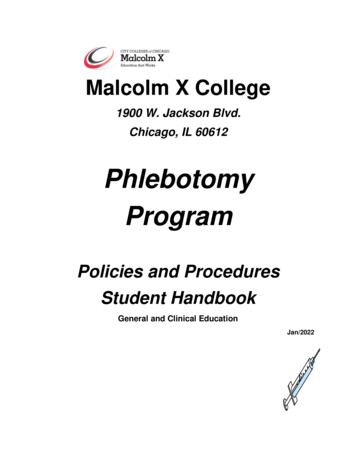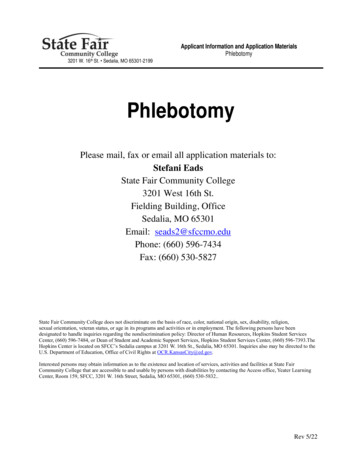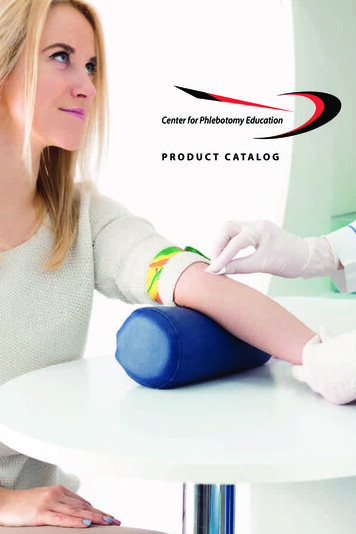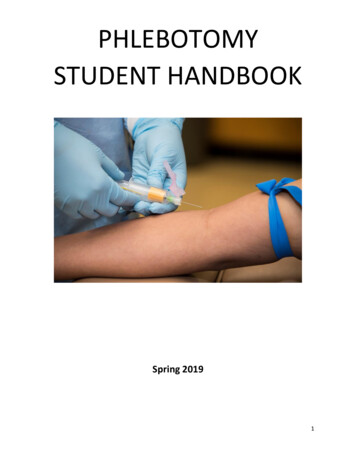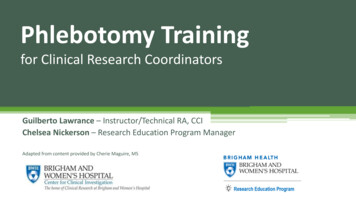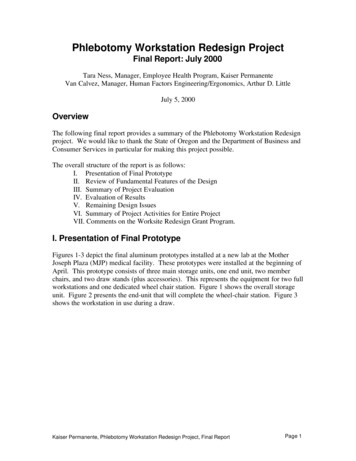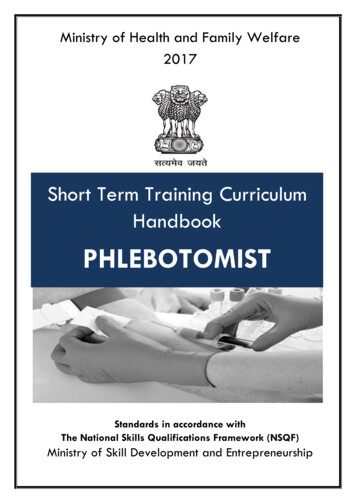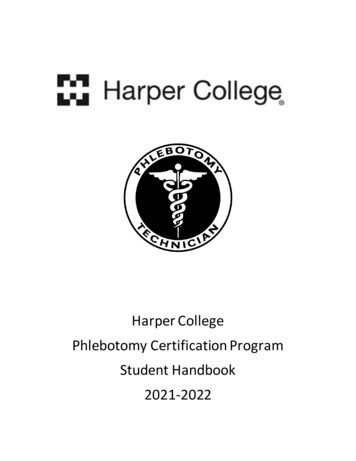
Transcription
Harper CollegePhlebotomy Certification ProgramStudent Handbook2021-2022
Phlebotomy ProgramTABLE OF CONTENTSWelcome . 4Overview and Organizing Framework of the Phlebotomy Program .51.0 Program Mission, Vision, Philosophy and Core Values1.1 Harper College Mission, Vision, Philosophy and Core Values 51.2 Phlebotomy Program Mission Statement . 61.3 Phlebotomy program curriculum outline . 61.4 Functional Abilities: Health Sciences Programs .6-71.5 Course Description and Objectives .7-81.6 Student Records .91.7 Advance Placement Policies 102.0 Phlebotomy Health Clearance Requirements2.1 Health Requirement Summary .10-112.2 Medcom Healthcare Courses. 112.3 Physical Exam . 122.4 Mumps, Rubella, Rubeola, Varicella IgG, Hep B Titers . 122.5 Hepatitis B .122.6 Tuberculin Skin Testing (TST) . 122.7 Health Insurance Verification.12-132.8 TDAP . 132.9 Flu Shot .132.10 Cardio-pulmonary Resuscitation (CPR) Certification. 132.11 Drug Screening . 142.11 “For Cause” Drug Screening. 152.12 Criminal Background Investigation.15-162.13 Failure to submit health requirements .163.0 Academic Requirements3.1 Student Code of Conduct. 163.2 Incomplete Grades . 163.3 Phlebotomy Course Repetition and Re- admission Requests .173.4 Academic Honesty. 183.5 Sexual Harassment and/or Discrimination Complaints. 183.6 Student Code of Conduct and Dispute Resolution Procedures. 183.7 Dismissal from the Phlebotomy Program.19-203.8 Standardized Sanctions: The Harper College Student Handbook Warning,Disciplinary Probation and Suspension Policy .20-213.9 In class volunteers. 213.10 Contacting Faculty. 21Harper College Phlebotomy ProgramPHB Student HandbookP a g e 2
4.0 Bloodborne Pathogen and Infectious Disease Policy4.1General-Professional Risks .214.2Exposure to Bloodborne Pathogens 21-224.3Patient Care .21-224.4Infection Control 234.5Immunizations 234.6HIV Testing .234.7TB Testing .234.8Obligation to Report .234.9Confidentiality .234.10 Chronic Communicable Diseases – Board of Trustees PolicyStudents 23-245.0 Clinical Placement, Requirements, Policies, Evaluations and Procedures5.1: Clinical Site Placement Availability .255.2: Service Work Policy. 255.3: Phlebotomy Student Uniform Requirements.26-275.4: Transportation. 275.5: Clinical Site Lunch Policy . .275.6: Reporting of Clinical Incidents .27-285.7: Recording of Clinical/Classroom Occurrences in WhichThere is a Breach of Standards of Phlebotomy Practice.28-295.8: Reporting Professional Dishonesty in the Clinical Setting 29-305.9: Health Insurance Portability and Accountability Act of 1996 (HIPAA) Privacyand Confidentiality.30-315.10: Non-Smoking Clinical Requirement . 32Appendix A: Student/Faculty/Agency Supervisor Conference FormAppendix B: Applying for the PBT (ASCP) Certification ExaminationAppendix C: Signature Form Following a Failure of a Phlebotomy CourseAppendix D: Report of Student Clinical/Classroom OccurrenceHarper College Phlebotomy ProgramPHB Student HandbookP a g e 3
WELCOMEWelcome to the Phlebotomy Program at Harper College! For many of you this is the first step inachieving your dream of becoming phlebotomist or advancing your health care professional skills.We are pleased that this course is a credit course that is articulated with Harper's certificationprogram. For others, this course will provide you with immediate skills to obtain employment in avariety of laboratory setting. No longer is phlebotomy something that occurs only in a hospital.Home health agencies, clinics, independent labs, and many other settings are hiringPhlebotomist. The increase in the number of people requiring your care is phenomenal.The Phlebotomy Program at Harper College is designed to prepare you to perform phlebotomyprocedures in the health care/lavatory setting. Training will include the development ofphlebotomy skills through class work, laboratory demonstration, student practice and clinicalexperience.We are here to help you. If you have questions about the course material or procedures, pleaseemail or talk with your instructor. If you have problems which interfere with your attendance orcourse work, please talk with your instructor.Delivering health care is a very special career; you can take pride in being part of a dedicatedgroup of individuals who help people and make our community a better place in which to live.Congratulations for taking the first step to becoming a certified phlebotomist.Donna OswaldDonna Oswald BS, PBT (ASCP)cmPhlebotomy Program Coordinatordoswald@harpercollege.eduPhone: 847-925-6922Office: X246Harper College Phlebotomy ProgramPHB Student HandbookP a g e 4
Overview and Organizing Framework of the Phlebotomy Program1.1Harper College’s Mission, Vision, Philosophy and Core ValuesMissionHarper College enriches its diverse communities by providing quality, affordable, and accessibleeducation. Harper College, in collaboration with its partners, inspires the transformation ofindividual lives, the workforce, and society.VisionWe will be an innovative and inclusive institution, the community’s first choice, and a nationalleader for student success.Philosophy StatementWe, at Harper College, believe that our charge is to facilitate active learning and foster theknowledge, critical thinking and life/work skills required for participation in our global society. Wework with our community partners to enrich the intellectual, cultural, and economic fabric of ourdistrict. We believe that excellence in education must occur in an ethical climate of integrity andrespect. We hold that the strength of our society is rooted in our diversity and that it is throughsynergy that we achieve excellence.Core Values INTEGRITYResult: An environment where relationships and practices are based on trust. KeyAction: Be responsible and accountable for your own actions. RESPECTResult: Interactions which add dignity to ourselves, our relationships with others and ourorganization. Key Action: Value and celebrate the uniqueness of individuals. EXCELLENCEResult: Student, employee, and organizational success through a creative andresponsive work environment by exceeding the needs and expectations of all. KeyAction: Effectively anticipate, identify, and respond to learner, employee, andorganizational needs. COLLABORATIONResult: Accomplishment of better results by working together than otherwise likely tooccur by working alone. Key Action: Address issues as they arise and take necessaryactions to productively resolve them.1.2Phlebotomy Program Mission StatementHarper College Phlebotomy ProgramPHB Student HandbookP a g e 5
The Phlebotomy Program’s mission is to educate and train entry-level competentand diverse phlebotomists with the mental, physical, and ethical knowledge andskills for career entry in the laboratory profession. It is also the department’smission to produce lifelong learners and to support the Harper College missionby offering quality phlebotomy courses and faculty designed to facilitate activelearning and foster the knowledge, critical thinking and life/work skills required forparticipation in the classroom and clinical settings. We believe that excellence ineducation must occur in an ethical climate of integrity and respect.1.3Phlebotomy program curriculum outlineFirst SemesterHSC112: Medical Terminology2 credit hoursPHB101: Principles and Practice of Phlebotomy4 credit hoursPrerequisite: Prior or concurrent enrollment in HSC 112 with a grade of C or better.Second SemesterPHB102: Phlebotomy Internship2 credit hoursPrerequisite: HSC 112 and PHB 101 with grades of C or better.1.4 Functional Abilities: Health Sciences ProgramsGeneral Functional AbilitiesThese are essential functions for admission and continuance in health career programs.Participants in health programs must possess the following functional abilities to provide safeand effective patient care. Some health programs have additional uniquefunctional requirements.Motor Capability1. Move from room to room and maneuver in small spaces.2. Squat, crawl, bend/stoop, reach above shoulder level, use standing balance, and climbstairs.3. Lift and carry up to 50 lbs. and exert up to 100 lbs. force or push/pull.4. Use hands repetitively; use manual dexterity; sufficient fine motor function.5. Must be able to walk and stand for extended periods of time.6. Perform CPR.7. Travel to and from academic and clinical sites.Sensory Capability1. Coordinate verbal and manual instruction.2. Auditory ability sufficient to hear verbal communication from clients and members of thehealth team; includes ability to respond to emergency signals.3. Discern soft sounds, such as those associated with taking a blood pressure.4. Visual acuity to acquire information from documents such as charts.5. Comfortable working in close physical proximity to patient.Communication AbilityHarper College Phlebotomy ProgramPHB Student HandbookP a g e 6
1. Communicate effectively in English with patients, families, and other health careproviders, both verbally and in writing.2. Effectively adapt communication for intended audience.3. Interact; establish rapport with individuals, families, and groups from a variety of social,emotional, cultural, and intellectual backgrounds.4. Assume the role of a health care team member.5. Function effectively under supervision.6. Sufficient command of the English language in order to retrieve information fromlectures, textbooks, as well as understand medical terminology.7. Skills include computer literacy.Problem Solving Ability1. Function effectively under stress.2. Respond appropriately to emergencies.3. Adhere to infection control procedures.4. Demonstrate problem-solving skills in patient care. (Measure, calculate, reason,prioritize, and synthesize data.)5. Use sound judgment and safety precautions.6. Address problems or questions to the appropriate persons at the appropriate time.7. Organize and prioritize job tasks.Behavioral Skills and Professionalism1. Follow policies and procedures required by academic and clinical settings.2. Adheres to Harper College Academic Honesty Policy (per College catalog).3. Adheres to Harper College Code of Conduct (per College catalog).4. Abides by the guidelines set forth in the Health Information Portability and AccountabilityAct (i.e., the national privacy act).1.5Phlebotomy 101: Principles and Practice Course Description and ObjectivesCourse Description: Includes the role of the phlebotomist, infection control and safety in theworkplace, venipuncture-collection equipment and supplies, skin puncture collectionprocedures, specimen handling, basic laboratory tests, quality assurance, communication skillsand professionalism. Includes micro and macro blood draws in class. Students who wish tobecome certified as phlebotomy technicians must complete this course and complete PHB 102with a grade “C” or better.Course Objectives:1. Demonstrate knowledge of the healthcare delivery system.2. Understand basic anatomy of body systems and anatomy terminology in order to relatemajor areas of the clinical laboratory to general pathological conditions.3. Understand the importance of specimen collection in overall patient care.4. Demonstrate knowledge of collection equipment, types of anticoagulants used, specialprecautions necessary and substances that can interfere in the clinical analysis of bloodconstituents.5. Demonstrate proper techniques to perform venipuncture and capillary punctures.6. Demonstrate knowledge of infection control and safety.Harper College Phlebotomy ProgramPHB Student HandbookP a g e 7
7. Understand requisitioning, specimen transport and specimen processing.8. Understand established policies and procedures to assure quality specimens and safety.9. Understand the basic concepts of communication, personal and patient interaction,stress management, professional behavior and legal implications of this workenvironment Didactic and Psychomotor objectives of PHB 101 please reference Didactic andPsychomotor Guidebook by request from the Phlebotomy Program Coordinator.1.5 Phlebotomy 102: Professional Practice Experience (PPE) Course Description andObjectivesCOURSE DESCRIPTION: Consists of 120 clinical hours of supervised phlebotomy practice ata local health care facility. The internship rotation schedule is arranged on an individual basis.Special registration permits for registering for the internship is required. NOTE: Possession of acurrent Cardiopulmonary Resuscitation (CPR) for the Healthcare provider certification card andcompletion of the program’s health requirements prior to placement in the internship.The granting of the degree or certificate is not contingent upon passing an external certificationor licensure exam. Successful completion of HSC 112, PHB 101 and PHB 102 will qualify thestudent to apply for Harper College degree and certification.Course Objectives includes the following:1.) Demonstrate knowledge of the healthcare delivery system and medical terminology2.) Demonstrate basic understanding of anatomy and physiology as it related to bodysystems and the venipuncture procedure3.) Demonstrate understanding of the importance of specimen collection and specimenintegrity in the delivery of patient care.4.) Demonstrate knowledge of collection equipment, various types of additives used, specialprecautions necessary, and instances that can interfere in clinical analysis of bloodconstituents.5.) Follow standard operating procedures to collect specimens.6.) Demonstrate understanding of requisitioning, specimen transport, and specimenprocessing.7.) Demonstrate understanding of quality assurances and quality control in phlebotomy.8.) Communicate (verbally and nonverbally) effectively and appropriately in the workplace.Didactic Content includes the following:I.II.Orientation to the clinical setting; Selection of clinical sites; Discussion of the evaluationmechanism and process.Discussion of “How to Conduct a Job Search”, Review of ASCP Board of CertificationPhlebotomy Examination information, Discussion of planning process to study for theMock Certification Examination.Harper College Phlebotomy ProgramPHB Student HandbookP a g e 8
III.IV.Discussion of Student Clinical experiences; Presentation of skills for the workplace;Taking the Mock Certification ExaminationReview of the Mock Certification Examination results; Clinical Evaluations; Assignmentof gradesClinical Objectives: Upon completion of this course, the student will be able to:1. Describe the basic concepts of communication, personal and patient interactions,diversity, stress management, professional behavior, and legal implications of this workenvironment.2. Demonstrate appropriate patient / client identification procedures3. Demonstrate appropriate procedures to show when performing a vacuum collectiondevice, syringe, capillary skin-puncture, or winged infusion apparatus, and state theadvantages and disadvantages of each procedure.4. Demonstrate knowledge of collection equipment, various types of additives used,necessary special precautions and substances that can interfere in clinical analysis ofblood constituents.5. Perform a minimum of 120 hours of clinical experience in varied clinical settings,including health fairs, donor and apheresis centers, nursing homes, ambulatory clinicalas well as in in-patient hospital settings.6. Correctly perform a minimum of 100 successful, unaided blood collections.7. Demonstrate proper technique when performing Point-of-Care procedures.8. Demonstrate an understanding of the appropriate requisitioning, specimen transport,and specimen processing procedures.9. Understand quality assurance in phlebotomy by correctly using the policies andprocedures in the affiliate setting to assure quality in obtaining the blood specimen.10. Demonstrate knowledge of infection control and laboratory safety by following universalprecautions as outlined by the Centers for Disease Control (CDC).Note: The PPE Coordinator will maintain regular contact with the student and site managerto monitor progress in meeting these objectives.***Please be aware there is a separate course fees applied to PHB 102 due uponregistration***.1.6 Student RecordsHarper College Phlebotomy Student Records i.e., signature pages, tests, quizzes, clinicalevaluation forms, coach and counseling session notes, and grades on student course work arekept in the office of the Phlebotomy Program Coordinator or division office for 3 yearsafter student completion date of each course. Student grade information is posted on the courseBlackboard site with no disposal date as this information is archived on the Blackboard site.Harper College Phlebotomy ProgramPHB Student HandbookP a g e 9
1.7 Advance Placement PolicyNo advance placement, transfer of credits or credits for experiential learning are accepted in thiscurriculum.2.0 Phlebotomy Health Clearance Requirements for the Phlebotomy ProgramRequirement StatementThe health requirements are mandated by clinical agencies. The Phlebotomy Program abidesby affiliating clinical agencies’ regulations for health requirements. Documentation of completionof health requirements must be on record in the Health Careers Division office as directed inthe phlebotomy orientation. Students who have not completed their health requirements bythe deadline date clinical placement will be deferred.2.1 Health requirements summary1. Annual Physical Exam (Submit required form presented by program coordinator)2. Mumps, Rubella, Rubeola, Varicella IgG, and Hep B titerso If results are negative or equivocal start appropriate vaccination series The vaccination series could take months to complete so please plan oncompleting blood titers early A titer is a laboratory test that measures the presence and amount ofantibodies in blood. A titer may be used to prove immunity to disease.3. Two-step Tuberculin Skin Testing (TST) or TB QuantiFERON Gold Blood Test (6months prior to clinical start)4. Yearly flu vaccination5. TDAP vaccination valid for 10 years5. Complete a Criminal Background Check/ Health Care Exclusion Check (90 days priorto clinical start)6. American Heart Association CPR certification for BLS provider (only)7. Health Insurance Verification (Students are responsible for maintaining continuoushealth insurance while in the Phlebotomy Program.)8. 11 Medcom Modules9. Complete Urine Drug Screen once given authorization to completeHarper College Phlebotomy ProgramPHB Student HandbookP a g e 10
10. Submission and upload of documentation must be presented to in the requiredtracking system for student health clearance11. Complete any new clinical agency health requirements as directed.2.2 Medcom Healthcare Courses1. Copy and paste the link in Firefox http://www.medcomrn.com/harpercollege2. Click the Create a New Account link on the right of the sign-in page3. Next select your group from the options (PHB)4. Then enter your Harper Student ID# as your user ID and the password of your choice.Enter password twice to verify. Click Submit5. Complete items with the red asterisk (email, first name, last name). Click Save6. Click on Courses click on 1. Mandatory Training Courses7. Complete required courses and quizzes 1 - 11. A grade of 80% on each quiz is required,you may repeat as many times as necessary for that grade.Medcom Module Titles:Chemical Hazards in the Healthcare Environment (0.5 hours Non-CE)Current Issues in Tuberculosis: Infection Control Procedures (Captioned) (0.5 hr.)Current Issues in Tuberculosis: The American Epidemic (Captioned) (0.5 hr.)HIPAA for Healthcare Workers: An Overview (Captioned) (0.5 hours CE)HIPAA for Healthcare Workers: The Privacy Rule (Captioned) (0.5 hr. CE)HIPAA for Healthcare Workers: The Security Rule (Captioned) (0.5 hr. CE)Infection Control and Standard Precautions: Guidelines for Professionals (1 hr. CE)Preventing Bloodborne Infections: Bloodborne Viruses (Captioned) (0.5 hr. CE)Preventing Bloodborne Infections: Engineering Controls and Workplace PracticeControls (Captioned) (0.5 hr. CE)10. Preventing Bloodborne Infections: Preventing Transmission, Protecting Yourself(Captioned) (0.5 hr. CE)11. Professionalism in Healthcare, Part 2: Patient Interactions, Communication, andPersonal Development (Captioned) (0.5 hours Non-CE)1.2.3.4.5.6.7.8.9.7. When all 11 courses are complete click on Completed courses and print list for yourinstructor or turn in to compile.8. For technical support click on link at the bottom of the web page.Harper College Phlebotomy ProgramPHB Student HandbookP a g e 11
2.3 Physical exam:1. A physical exam must be signed and dated by a health care provider within thecurrent year.2.4 Mumps, Rubella, Rubeola, Varicella IgG, Hep B titers:1. Proof of immunity must be documented with a laboratory report with current-up-dateMMRV and Hep B titers.2. Documentation of vaccination administration does not take the place of proof of anacceptable titer.3. If not immune to Varicella, Mumps, Rubella or Rubeola or Hep B the student muststart the immunization series before beginning clinical and complete immunizations asscheduled. Therefore, vaccinations must be initiated, at minimum, a month beforeclasses begin.4. Students should not have Mumps, Rubella, Rubeola, or Varicella vaccinationsadministered until the two-step Tuberculin Skin Test (TST) has been completed.2.5 Hepatitis B:1. Hepatitis B immunizations are required for those who never had the vaccine or thosewith a negative titer. The IgG titer is required 30 days after the completion ofimmunization series (there is 3 doses in the series). If titer does not indicate immunity,the series will need to be repeated.2.6 Tuberculin Skin Testing (TST):1. TST must be completed no more than 90 days prior to clinical experience.2. A two-step TST must be done according to CDC December 30, 2005 guidelines.3. Also acceptable is the QuantiFERON TB gold blood test2.7 Health Insurance Verification:1. Proof of insurance coverage must be submitted to the required tracking system forstudent health clearance2. Proof of insurance consists of a letter of verification of coverage from an employer. Itmust be on company letterhead with the current date, student’s name, statement that thestudent has health insurance, name of the insurer, and signature of the company officer.Harper College Phlebotomy ProgramPHB Student HandbookP a g e 12
3. If the student has a personal health insurance plan, a letter from the local insuranceagent will provide proof.4. Students without health insurance coverage please discuss with the ProgramCoordinator6. Any changes in insurance coverage must be presented to in the required trackingsystem for student health clearance2.8 Tdap vaccine Students must obtain a Tdap vaccine in the last 10 years2.9 Flu Shot Students attending clinical must provide document of yearly flu shot2.10 Cardio-pulmonary Resuscitation (CPR) Certification:All students must complete a Health Care Provider CPR course through the American HeartAssociation (only) prior to admission into PHB 102. No student will be allowed to participate inclinical practice without verification of a current CPR certification. The student will be ineligiblefor clinical placement.Procedure:1. Validation of CPR certification must be presented and verified prior to clinicalplacement.2. Students must always carry an active BLS CPR card.3. When CPR certification is renewed, the certification must be presented to in therequired tracking system for student health clearance4. Only CPR certification from American Heart Association will be accepted for BLSproviderHarper College Phlebotomy ProgramPHB Student HandbookP a g e 13
5. If the student completes their CPR with another organization than American HeartAssociation it will be the student’s responsibility both scheduling and monetary tocomplete the required training as requested above.2.11 Drug Screening: As health care professionals, phlebotomy faculty and phlebotomystudents are expected to demonstrate healthy lifestyle choices to peers, professionalcolleagues, and patients. Use of alcohol or illegal drugs, or misuse of prescription drugs, arestrictly prohibited in the classroom, clinical or laboratory setting.1.Students must complete the drug screen 90 days prior to clinical start onceapproval is provided by program coordinator.2.Students need authorization to complete the urine drug screen completing priorto authorization could subject the student to paying for the urine drug screen more thanonce3.The drug screen is not included in the fees for the PHB 101 course. Privatehealth insurance will not pay for this testing. The drug screen will be purchases throughhealth tracking system used by the college.4.Students should not take prescription medications to the lab at the time oftesting. Students may be required to provide a list of prescription medications that theyare taking.5.Results of the screening will be given to the Phlebotomy Program Coordinator,Health Careers Division. If a student provides a sample that is inconclusive, anadditional test must be performed on that sample at an additional cost to the student.6.Only students receiving negative drug screens may remain enrolled inphlebotomy courses.7.A student, who tests positive in a Drug Screening conducted under thisprocedure for drugs that are illegal substances or are non-prescribed substances thatrequire a prescription for lawful use, or are deemed unsafe for the clinical setting, will beremoved from phlebotomy courses, and may be dismissed from the PhlebotomyProgram. Such removal or dismissal is subject to additional testing of the originalsample at the student’s request and expense, and to academic appeal as set forth inHarper College’s Student Code of Conduct and Dispute Resolution Procedures.8.If a student challenges the results of the screening, only the original sample willbe tested. The student is responsible for the cost of the retests.9.Students failing to complete the drug screening during the date and time requiredin the initial notification will be withdrawn from phlebotomy courses due to failure to meetthe drug screening requirement.10.Students with unacceptable (urine drug screening) results will not participate atclinical sites where students with such results are forbidden by policy.11.The student is only allowed one attempt to complete the urine drug screen (NoExceptions!!) and those test results are final. There is not another opportunity torepeat the urine drug test later.2.11“For Cause” Drug ScreeningHarper College Phlebotomy ProgramPHB Student HandbookP a g e 14
1. If faculty observes a student behaving in a manner that is consistent with the use ormisuse of alcohol, illegal drugs, or drugs which impair judgment, affecting either theclassroom, clinical or laboratory setting, the student will be removed from theeducational setting and required to submit to drug screen.2. If the behavior is noted in the clinical setting, the student will be removed from patientcare. Harper College Police Department will be notified and will transport the studentto the agency or laboratory with which the College has contracted to perform drugtesting required by the Phlebotomy Program, or to the agency or laboratory specifiedby the clinical placement agency if its workplace rules so require.3. If the behavior is noted on campus in either the classroom or laboratory settingHarper College Police Department, will be notified and will transport the student tothe contracted agency for drug testing.4. If the results of the urine drug screening are negative the student shall meet with thePhlebotomy Coordinator within 24 hours of the test results to discuss thecircumstances surrounding the impaired behavior. Based on the information providedand furt
PHB101: Principles and Practice of Phlebotomy 4 credit hours . Prerequisite: Prior or concurrent enrollment in HSC 112 with a grade of C or better. Second Semester . PHB102: Phlebotomy Internship 2 credit hours . Prerequisite: HSC 112 and PHB 101 with grades of C or better. 1.4 . Functional Abilities: Health Sciences Programs
